The angel Gabriel told the virgin Mary that she was “highly favored” with God, yet she was “troubled” when she heard this news (Luke 1: 26-29), with good reason. After recovering from the fear and awe Gabriel caused her by his visitation and life-changing news, Mary had so much more to face as the reality hit her of this incredibly difficult yet significant assignment.
As a teenaged, betrothed virgin, she was pregnant, not with just any child, but with the Son of God conceived by the Holy Spirit (Luke 1:30-35). She would face rejection and criticism by her community, and the hurt and bewilderment of her fiancé Joseph, who thought she had been unfaithful and betrayed him (Matthew 1:18-19). She would escape the prying eyes and wagging tongues by traveling to the hill country to reach her cousin Elizabeth, an old woman also miraculously with child (Luke 1:36-40).
Then Mary and Joseph would set off for Bethlehem (Luke 2:4) on a long, bumpy journey with her precious Child bouncing up and down with each step of the donkey. She would wonder why no innkeeper could find room for the promised Messiah or His earthly family (Luke 2:7). She would endure the pain of childbirth in a smelly stable on scratchy hay, without any earthly comfort or help other than that given by her inexperienced husband and the warmth of the animals.
She would wonder why the King of Kings was not welcomed, recognized, and worshipped by most of those He came to save (John 1:10). She would face the pain and fear of knowing that Herod was trying to kill Him (Matthew 2:16-18) and that a sword would pierce Him and her soul also (Luke 2:34-35).
Yet the Bible says she was highly favored. How had she found favor with God? When faced with the impossible, Mary knew she had no strength, wisdom, experience or support of her own, and that the Lord Himself was her strength and her salvation. She turned it all over to Him, accepting His will and her role as “the handmaiden of the Lord” (Luke 1:38) with grace, courage and praise (Luke 1:46-49). He chooses those whom He favors not based on their ability, but on their availability and yieldedness to His will.
How did God show His favor toward Mary? God often favors His chosen servants not with worldly success, power, prestige, comfort and riches, but with trials that He can use to accomplish His will to His glory. Yet if He called you for a specific mission, He will provide all you need to complete it, once you are saved by trusting in His death, burial and resurrection (1 Corinthians 15:1-4) as the only Way (John 14:6) to Heaven..
God sent angels as ministering spirits (Hebrews 1:14) -- He sent Gabriel to Mary to inform her of His plan (Luke 1:30-35); and He sent an angel to Joseph so that He would help Mary carry out this plan (Matthew 1:20-25). He sent Mary to Elizabeth so that they could encourage and uplift each other (Luke 1:39-45). He sent angels to tell shepherds to worship the newborn King (Luke 2:8-20) and He sent a star to lead wise men to also worship Jesus (Matthew 2:2-11), giving Mary confirmation that her Child was indeed the Son of God. He spoke through dreams to protect Jesus from the evil plot of King Herod (Matthew 2:12-23).
We can do nothing apart from God (John 15:5,8), but with Him, all things are possible (Matthew 19:26; Luke 1:37).
So no matter what our weaknesses or what resources or experience we seem to lack, let’s be yielded to God’s will, and give Him praise as He works through us! His grace is sufficient; His strength is made perfect in our weakness (2 Corinthians 12:9); and to Him belongs all the glory!
Luke 1:28 And the angel came in unto her, and said, Hail, thou that art highly favoured, the Lord is with thee: blessed art thou among women.… And Mary said, Behold the handmaid of the Lord; be it unto me according to thy word.… 46 And Mary said, My soul doth magnify the Lord, 47 And my spirit hath rejoiced in God my Saviour. 48 For he hath regarded the low estate of his handmaiden: for, behold, from henceforth all generations shall call me blessed. 49 For he that is mighty hath done to me great things; and holy is his name.
© 2011 Laurie Collett
Reposted from the archives









